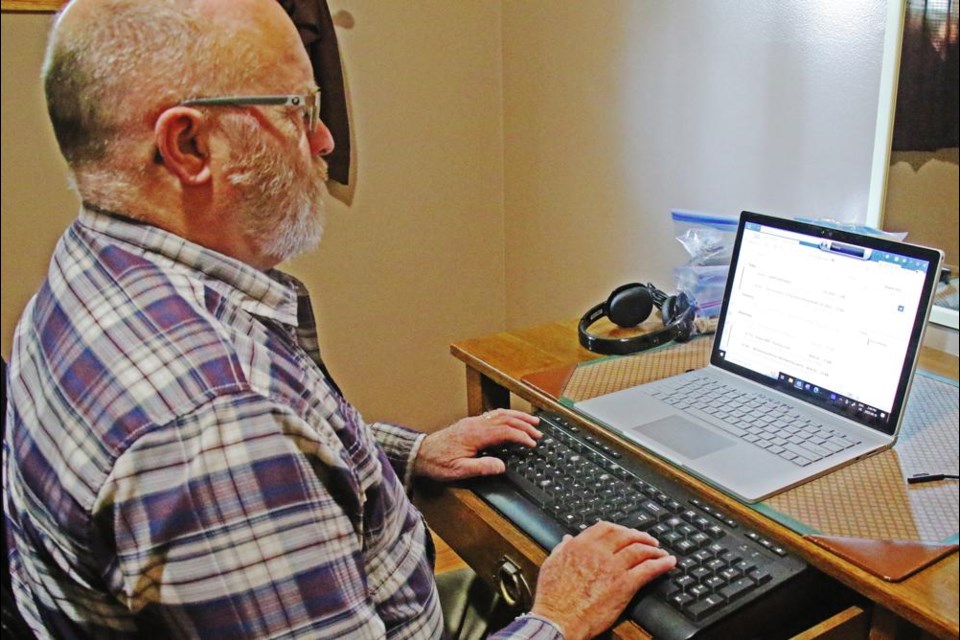WEYBURN – Most people can open their eyes in the morning and see clearly what they want and need to do, as they get up and go through their day.
For Weyburn resident Duane Schultz, that hasn’t been the case for about seven years now, as macular degeneration has taken most of his eyesight, and all he can see now are differences between dark and light.
In an interview at his home, Duane described what some of the challenges and helps there are for him in a world that is set up to accommodate the sighted.
To illustrate what he faces in navigating around the city, he related an experience that happened to him a few months ago in the downtown area.
“I had been to the Royal Bank, and I walked down Souris Avenue intending to go to the mall. I came to the intersection (at Second Street), and I could hear a motor idling on my left side, so I knew it had a red light. I crossed the street and got to the curb, and started to walk across – but nothing with my cane felt right. The mall should’ve been over to my left.
“There was a curb, I moved to my right and there was an iron post or a railing. I realized I didn’t know where I was and stood there for a moment, so finally someone asked me, ‘do you need some help?’ I said, ‘Yeah, can you tell me where I am?’ He said, ‘You’re in front of the TD bank.’ I thought I had crossed the street, but I had crossed diagonally across the intersection. Nobody honked their horn and said anything to me – they must’ve thought, ‘what is this guy doing?’” said Duane, adding the man he talked to then offered to guide him across the street over to the mall.
“This had happened once before, about two years ago,” he added, relating an experience where he walked through the alley from Third Street over to Second Street, and got disoriented. A man who asked if he needed help told him he was in the middle of Railway Avenue.
“That wasn’t very exciting. I make mistakes, and I had been blind for about a year at that time,” said Duane.
The City has some new traffic lights that are capable of emitting signals for the visually impaired, like Regina has in their downtown, but Weyburn has chosen not to activate those, he said.
He uses a number of aids to help him get around, including a hand-held “Trek” device that acts as sort of a GPS, among other things (such as accessing and reading e-books to him), and a virtual assistant named Bixby on his cell phone.
He also has walking canes, with three different tips, depending on the surface he might encounter with them while he’s out. Of the three, his favourite tip is a round ball on the end of the cane, which works for most of the surfaces he encounters.
On his laptop, he uses a program called JAWS, which will read text to him, such as his emails, and when he watches TV, he uses a descriptive service which explains what is happening in a given scene. One service, BMI, gives very detailed descriptions, such as what a room looks like, which he said his wife Lorrie likes, because it will catch things visually that she maybe didn’t pick up on while watching the show.
“I didn’t realize until after I lost my sight how visual a person I was,” said Duane, noting for example their home has many paintings and works of art on the walls, and he very much enjoyed studying them and appreciating them.
“I used to really enjoy visual stimulation, just to able to see a sunrise or a sunset, or to look at see how my kohlrabi was growing. I miss working in my workshop,” he added, noting he does do some projects in his garage, but jobs that used to be simple can now take hours to do.
Duane described a current project where he was turning two closet doors into a table, something he had done before and might’ve taken him an hour to do. Now, he had just spent four hours on the project the day before the interview, and still had a two or three hours of work to finish it.
“How do you measure without sight?” he asked, adding he also used to love cooking. He can still cook some things, but measuring liquids can be very challenging and messy, as he noted Lorrie sometimes makes him measure liquids over the sink to minimize the mess.
“It’s not impossible to do many of the things I used to do, but it can take two, three, four times as long, and there are some things I can’t do,” said Duane.
He is part of the Weyburn Peer Support Group for the Visually Impaired, which meets every Thursday, and he’s been helped quite a bit by the CNIB in Regina. A number of the aids and apps he uses are courtesy of the CNIB.
“I get a lot of help from Lorrie, from family and friends, and even from strangers sometimes,” he said. “Even on the streets of Regina, if I ask if anyone can help, there usually will be someone – but you have to ask.”



